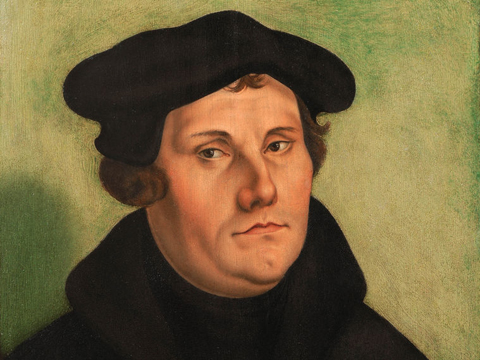
Part I
Part II
The celebration of 500 years of the Reformation this year is inspired by the early work of Martin Luther done in 1517 in Wittenberg. Having referenced two proto-reformers from preceding centuries, I regard it appropriate to start off our treatment of the sixteenth-century reformers with the greatest of them all, Martin Luther.
Luther once wrote:
I also boast that Japheth, Noah’s firstborn son, is my true, natural ancestor and his wife (whoever she may have been) is my true, natural ancestress; for as Moses informs us in Genesis 10, he is the progenitor of all of us Gentiles. Thus Shem, the second son of Noah, and all of his descendants have no grounds to boast over against his older brother Japheth because of their birth. Indeed, if birth is to play a role, then Japheth as the oldest son and the true heir has reason for boasting over against Shem, his younger brother, and Shem’s descendants, whether these be called Jews or Ishmaelites or Edomites.
The context of this quote is Luther addressing the semitic claim to religious supremacy based on their lineage. We recognize this rhetorical strategy: Luther is debunking the notion that the Jews are God’s chosen people (and therefore ought to be tolerated and venerated, as by Christian Zionists). Nonetheless, there is a particular sentiment underlying his choice of rhetorical strategy. It is vital to note that Luther critiques semites not for taking pride in their racial ancestry as such, but for their claim to special rights and supremacy over white Christian peoples – even in their own lands. He continues to lament:
what we Gentiles have to put up with in their synagogues, prayers, songs, and doctrines!
So Martin Luther argues that European people have just as much claim to cherish their ancestry as non-white people do, as exemplified by Luther’s cherishing of his own Japhethite ancestry. In addition to cherishing this racial heritage, Luther also cherishes the covenantal promise to Japheth as the white race’s ancestor, that we would be incorporated into the spiritual nation of Israel (Gen. 9:27):
It was Paul through whom this prophecy was fulfilled. He almost unaided taught the Gospel doctrine to the posterity of Japheth. He says: “From Jerusalem, and round about even unto Illyricum, I have fully preached the Gospel of Christ” (Rom 15, 19). Almost all of Asia, with the exception of the oriental peoples, together with Europe, belongs to the posterity of Japheth.
Note that Luther presupposes that certain peoples residing in certain lands collectively “belong to the posterity of Japheth.” That is, he sees certain nations as united by common ancestry. And while an alienist could say that this is just how the world happened to be at that time, it is obvious that Luther regards this as the natural and God-ordained order, in fact necessary for us to receive and witness the fulfillment of the promise to Japheth. If nationhood had nothing to do with common ancestry, then how could we even know when or whether the posterity of Japheth has embraced Christ’s Gospel?
Luther therefore realizes that national heritage is a positive good, that the borders of lands given to white nations as Japheth’s posterity are to be respected, and that national identity is redeemed in each nation as it is sanctified in Christ.
That Luther valued lineal descent as a covenantal means of applying redemption becomes even clearer when we read what he had to say on the Table of Nations presented in Genesis 10:
Whenever I read these names, I think of the wretched state of the human race. Even though we have the most excellent gift of reason, we are nevertheless so overwhelmed by misfortunes that we are ignorant not only of our own origin and the lineal descent of our ancestors but even of God Himself, our Creator.
There can be no doubt that the great German Reformer cherished his racial ancestry as a gift from God.
Part IV: John Calvin Contra Racial Egalitarianism
| Tweet |
|
|
|




